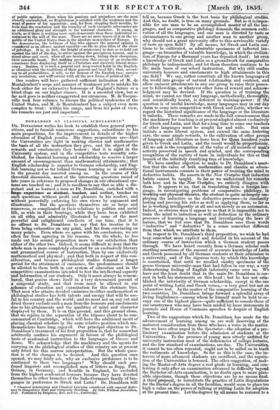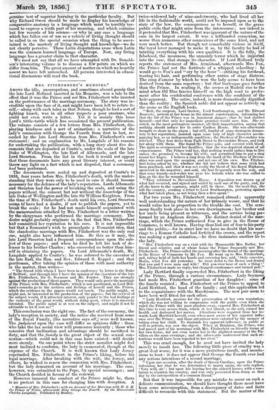DONALDSON ON CLASSICAL SCHOLARSHIP. * Dn. DONALDSON writes his book to
establish three general propo- sitions, and to furnish numerous suggestions, subordinate to his main propositions, for the improvement in details of the higher education of English youths. His three propositions are—that the Universities are right in making classics and mathematics the basis of all the instruction they give, and the object of the rewards and emoluments they bestow ; that it is right in the University system and in, the competitive tests recently esta- blished, for classical learning and scholarship to receive a larger amount of encouragement than mathematical attainments ; that English scholarship is superior to German scholarship, and Eng- lish learning not so far behind German learning as is ordinarily in the present day asserted among us. In the course of this threefold discussion, most of the interesting questions raised of late years in reference to proposed changes in our educational sys- tems are touched on ; and It is needless to say that so able a dis- critant and so learned a man us Dr. Donaldson; enriched with a large experience as student,--teasher, and author; touches no such questions without profit and pleasure to his readers, and without powerfully enforcing his own views by argument and illustration. But the questions themselves are so large and numerous, so complicated in their relations to politics and social life, so wide in their bearings, while they'have been exhibited on all sides and admirably illustrated by some of the most powerful and enlightened intellects of our time, that it is no affront to Dr. Donaldson to say that his treatise is far from being exhaustive on any point, and far from convincing on many points. Even where we agree with his conclusions, we are often far from agreeing in his reasons. On the whole, he has made out his second proposition more to our satisfaction than either of the other two. Indeed, it seems difficult to deny that the whole man is more completely educated by an exclusively literary and grammatical course of instruction, than by one exclusively mathematical and physical ; and that both in respect of this con- sideration, and because philological studies demand a longer period for the attainment of eminence, the predominance should be allotted to them both in our system of education and in the ,eompetitive examinations intended to test the intellectual capacity and information of our students. Only it must always be remem- bered, that genius shows itself in a very determined pursuit of a eongenial study, and that room must be allowed in our .sehenies of education and examination: for this obstinate bias. That man who attains decided eminence in either mathematical or philological studies has both talents and energy that will be use- ful-to his country and the world; and we must not on any cut and "dried theory exclude such a man from the honours and emoluments due to his attainments and the qualities. of mind and character Asplayed by them. It is on this; ground, and this ground alone, that we rejoice in the separatiOn of the triposes about to be con- summated at Cambridge, which will have the additional merit of placing classical scholars in the same relative position which ma- thematicians have long. enjoyed. Our principal objection to Dr. Donaldson's treatment of his first proposition is, that he somewhat arbitrarily confines his argument in favour of the philological basis of academical instruction to the languages of Greece and Rome. We acknowledge that the machinery and the agents for carrying on the philological studies of this country are at present only fitted for this narrow interpretation. But the whole ques- tion is of the changes to be desired. And this question once opened, we may fairly ask, why an exclusive preference is to be continued to these two languages ? Why should such pro- found linguists and accomplished men of letters as Bopp, l'ott, Grimm, in Germany, and Kemble in England, be excluded from the highest academical honours because they have devoted themselves to other branches of the Indo-Germanic family of lan- guages in preference to Greek and Latin ? Dr. Donaldson will Classical Scholarship and Classical Learning considered with especial Refer- ence to Cbmeetitiee Tests and University Teaching. By John William Donaldson, D.D. Published by Deightou, Bell, and Co., Cambridge. tell us, because Greek is the best basis for philological studies. And this, no doubt, is true on many grounds. But as it is impos- sible for one man to be an accomplished master of all the lan- guages, and as comparative philology demands the common culti- vation of all the languages, and one man is directed by taste or circumstances to one group and another man to another group, why should not a great university offer to this serviceable variety of taste an open field? By all means, let Greek and Latin con- tinue to be cultivated, as admirable specimens of inflected lan- guage—as treasuries of valuable knowledge, in which the civiliza- tion of Europe for a thousand years has deposited itself ; let even a knowledge of Greek and Latin as a groundwork for comparative philology be indispensable, and let them therefore continue to be the main bases of our school' instruction. But why still confine university honours and emoluments to high attainments in this one field ? We say, rather constitute all the known languages of the world into groups of natural relationship and contrast, and allow eminent attainments in any one group to raise their posses- sor to fellowships, or whatever other form of reward and acknow- ledgment may be devised. If the question is of training the mind, we cannot see that any language, methodically, thoroly, and scientifically learnt, is deficient in training-power : if the question is of useful knowledge, many languages may in our day claim to come into competition with Greek and Latin, whether we regard the historical significance of the language or the literature it unlocks. These remarks are made in the full consciousness that the machinery for teaching is at present adapted almost exclusively for Greek and Latin, and that for a long time to come our teachers of other languages must be sought far and wide. But once initiate a more liberal system, and extend the same fostering card, the same ample rewards, to the cultivation of other groups of language and literature as have been for three hundred years given to Greek and Latin, and the result would be proportionate. All we ask is the recognition of the value of all records of man's activity preserved in speech and sy.mbol, and the corresponding recognition of the variety of taste in individuals for this or that branch of the infinitely ramifying tree of knowledge. We have another objection to make to Dr. Donaldson's asser- tion that the value of both mathematics and classics as educa- tional instruments consists in their power of training the mind to deductive habits. He asserts in the New Cratylus that inductive habits cannot be taught. So far as we understand his remarks both here and in the New Cratylus, we entirely disagree with them. It appears to us, that in translating from a foreign lan- guage, in investigating problems of comparative philology, in worki4out Thyfficed theories, the student is quite as largely em- ploying the inductive as the deductive processes—is constantly testing and proving his rules as well as applying them, -so far as he is working intelligently at all and not merely as an automaton. Indeed, so obvious does it appear to us that it is impossible not to train the mind to induction as well as deduction in the ordinary processes of learning a le and investigating the laws of nature, that we feel sure7tturtat€Dr. Donaldson uses these words "-inductive " and " dednetive " in a sense somewhat different from that which we attribute to them.
In respect to Dr. Donaldson's third proposition, we wish he had been somewhat more explicit and detailed in his account of the ordinary course of instruction which a German student passes through. We have heard recently from a German scholar such startling assertions of the amount of accurate knowledge of Latin and Greek possessed by all German students at their admission to a university, and of the rigorous tests by which this knowledge is ascertained, that until we recalled sundry, specimens of the genus German university-man that had fallen in our way, a very disheartening feeling of English inferiority came over us. We have not the. least doubt that in the main Dr. Donaldson is cor- rect in both his statements on this head • but he has not esta- blished the inferiority of German scholarship, except in the one point of writing Latin and Greek verses,—a very good but not an exhaustive test. In the matter of the comparative learning of the two countries, Dr. Donaldson brings forward a splendid array of living Englishmen—among whom he himself must be held to oc- cupy one of the highest places—quite sufficient to console those of our countrymen who may have been misled by loose statements in journals and House of Commons speeches to despair of English learning.
Two of the suggestions which Dr. Donaldson has made for the advancement of learning among us are well deserving of the maturest consideration from those who have a voice in the matter. One we have often urged in the Spectator—the adoption of a pre- liminary examination before the admission of students at the Universities. To the presence of young men utterly unfitted for university instruction most of the deficiencies of college lectures, and the low standard of examinations, are due. The Universities, it cannot be too often repeated, ought not to be called on to teach the rudiments of knowledge. So far as this is the case, the in- terests of more advanced students are sacrificed, and the reputa- tion of the Universities is lowered. The other suggestion, of mak- ing the Master-of-Arts degree a real grade in learning, and con- ferring it only after an examination advanced in difficulty beyond. the Bachelor-of-Arts examination, is no doubt open to more plau- sible objections, though these olijections are by no means final. A third proposal, to reinstitute the practice of Latin disputations for the Doctor's degree in all the faculties, would seem to place too high a value on the power of talking or writing Latin for adoption at the present time. Let the degrees by all means be restored to a genuine test of superior learning in the particular faculty. But why Richard Owen should be made to display his knowledge of oom arative anatomy in a language which must be terribly tor- tured to express a tenth part of his meaning, and which contains but few records of his science—or why in any ease a language which has fallen out of use as a vehicle of living thought should be called in on the special occasion when the thing to be ascer- tained is the mastery of living thought and knowledge—we do not clearly perceive. These Latin disputations arose when Latin was the common learned language of Europe. Now, any living language has a greater claim to that character. We need not say that all we have attempted with Dr. Donald- ion's- interesting volume is to discuss a few points on which we differ from him. The great amount of matter on which we heartily assent_ we have left untouched: All persons interested in educa- tional discussions will read the book.



























 Previous page
Previous page